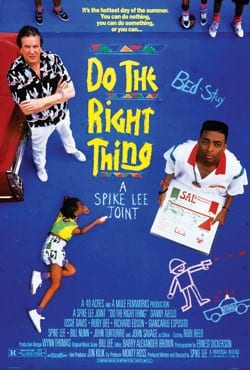
Speaking to a packed auditorium of college students at Boston University, famed filmmaker Spike Lee gave the simple advice: “Find out what it is that you love.”
“The luckiest people in the world, I think, are people who do what they love,” said the acclaimed director and two-time Academy Award nominee. “When you do what you love, it’s not even a job. I did not become a filmmaker to become rich or famous. I became a filmmaker because I love filmmaking, and I love storytelling.”
Lee earnestly reflected on his life, the challenges he faced, the mistakes he made and his ultimate success, while at the same time offering bits of wisdom to the young crowd. “Try to find out what it is that you love,” he repeated, “and don’t base that solely on how much money [you’re] going to make.”
Lee grew up in Brooklyn, N.Y., and never considered filmmaking until his junior year at Morehouse College in Atlanta, Ga.
A C student his first two years of college — “not because I wasn’t intelligent, I just wasn’t inspired” — Lee went back to New York the summer after his sophomore year looking for a job. But in the summer of 1977, there were no jobs to be found. So he dug up an old camera and began shooting raw footage of the sights and sounds of the city.
Lee returned to college the next fall and a professor encouraged him to turn the footage into a story — and with that, his passion for filmmaking was born.
Immediately, Lee became an A student, “because I was motivated.”
“What’s pivotal is that I was lucky to find out what it is that I wanted to do with my life,” he said. “Because some people never find out. Some people flounder and go this way and that way, no direction their whole life. And it’s on you to find out what that is.”
After graduating from Morehouse, Lee entered one of the top film schools in the country, New York University’s Tisch School of the Arts. At the time, black culture was not usually depicted on television or film — and black directors were even more uncommon. Telling friends he wanted to be a filmmaker, he explained, “I might as well have said I was gonna try to walk to the moon.”
Lee’s thesis film, “Joe’s Bed-Stuy Barbershop: We Cut Heads,” won the Student Academy Award in 1983, and with it, Lee thought his success was guaranteed.
“I knew that with a student Academy Award, that Warner Brothers, Paramount, Columbia, Spielberg, Lucas — I knew they were gonna call me, because I had just won the Student Academy Award,” he said.
But no calls came.
Instead, Lee joked, his electricity, phone and gas were turned off because he couldn’t pay the bills — “so eventually I had this Student Academy Award that I couldn’t see because the lights were turned off!”
But in this setback, Lee realized his mistake and vowed to change. “This was a very key moment because this is really what made me wake up to how it really works,” he said. “I was just sitting on my butt waiting for the hand of God to come down and anoint me The Next One . . . [instead] I’m gonna have to grind to make it happen.”
So he wrote a screenplay and began filming what would become his first feature-length movie, “She’s Gotta Have It.”
Although Lee stressed the importance of personal responsibility and determination, he also credited his success to the strength and support of his family, in particular his mother, who always pushed him to excel, and his grandmother, who saved Social Security checks for 50 years to pay for his education.
Much has changed since Lee was young — laptops and cell phones mean students no longer need film school to make movies. But Lee insists that one thing remains the same — the importance of staying true to oneself.
“What is it in your voice that’s going to stand out from half a million others’ stuff out there?” he asked the audience. Instead of imitating others, “you should be right now trying to develop your own voice, looking at stuff in different ways and trying to get answers to the many problems we have today.”






